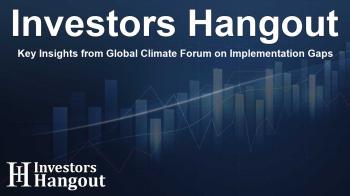Key Insights from Global Climate Forum on Implementation Gaps

Global Climate Forum Addresses Key Implementation Gaps
At a recent forum held at Tsinghua University, global experts and policymakers convened to tackle a pressing issue affecting climate action today: the growing divide between ambitious climate pledges and actual progress on the ground. This significant event coincided with the tenth anniversary of the Paris Agreement and showcased the launch of the 2025 Global Carbon Neutrality Annual Progress Report, which provides a meticulous analysis of the world's journey towards carbon neutrality.
Engaging Presentations and Discussions
The forum's theme, "Global Progress and China's Practice," opened with insightful remarks from Liu Yang, the Deputy Director General of the Department of Climate Change, Ministry of Ecology and Environment in China. Her presentation shed light on China's advancements towards achieving its dual carbon goals and highlighted a new Nationally Determined Contribution (NDC). Following her talk, Patricia Espinosa Cantellano, the former UNFCCC Executive Secretary, provided an international perspective, emphasizing the urgent need for collaborative action.
Insights from the Annual Progress Report
The spotlight of the event was the unveiling of the third annual progress report, expertly led by Professor Wang Can of Tsinghua University. This comprehensive study stands out for its extensive, science-based evaluation of climate progress around the globe, offering insights that are vital for future action. The report is significant for several reasons, including:
- Comprehensive Tracking: Analyzing 198 countries and regions, with 217 indicators spanning technology, finance, and policy.
- Equity Evaluation: Implementing an equity lens to assess justice within the global transition towards carbon neutrality.
- Continuous Evaluation Commitment: Ensuring ongoing assessment to inform and enhance global climate governance.
This year’s report also enjoys the guidance of a 13-member international Advisory Committee, co-chaired by He Kebin from Tsinghua and Erik Solheim, former UNEP Executive Director. This collaboration emphasizes a blend of Chinese leadership with a global outlook.
Identifying Structural Imbalances
One of the report's critical messages is the identification of a "profound structural imbalance"—despite an atmosphere ripe with ambition and innovation, significant obstacles remain in climate finance and international collaboration. This gap creates what is termed an "implementation gap," where the distance between declared intentions and actual results becomes increasingly apparent.
The meticulous methodology used in the report has been applauded by global climate leaders. Patricia Espinosa Cantellano remarked, "This research into climate is vital for bolstering our sense of purpose and hope," noting the effectiveness of the report's four-part framework—target, policy, action, and effectiveness—which presents a transformative approach to tracking climate progress.
Looking Ahead at COP30
The discussions and findings from this forum are not meant to stand alone; rather, they aim to serve as a solid scientific foundation for developing stronger NDCs and guiding the essential dialogues anticipated at the upcoming COP30 in Brazil. By underscoring the irreversible progress of the green transition alongside the urgent requirement to bridge the implementation gap, the event culminated in a compelling call to action for renewed international collaboration to convert commitments into substantial outcomes.
Frequently Asked Questions
What was the purpose of the Global Climate Forum at Tsinghua University?
The forum aimed to address the widening gap between climate pledges and actual progress, presenting crucial research findings on global carbon neutrality.
Who were the notable speakers at the forum?
Key speakers included Liu Yang from China's Ministry of Ecology and Environment and Patricia Espinosa Cantellano, former UNFCCC Executive Secretary.
What is the significance of the 2025 Global Carbon Neutrality Annual Progress Report?
This comprehensive report tracks climate progress across 198 countries, providing insights to enhance future climate governance and actions.
How does the report address structural imbalances in climate action?
It highlights the disconnect between ambition and results due to bottlenecks in climate finance and international cooperation, referred to as the 'implementation gap.'
What is the expected outcome from the findings of the forum?
The findings are intended to shape stronger NDCs and guide critical discussions at COP30, pushing for effective climate action globally.
About The Author
Contact Riley Hayes privately here. Or send an email with ATTN: Riley Hayes as the subject to contact@investorshangout.com.
About Investors Hangout
Investors Hangout is a leading online stock forum for financial discussion and learning, offering a wide range of free tools and resources. It draws in traders of all levels, who exchange market knowledge, investigate trading tactics, and keep an eye on industry developments in real time. Featuring financial articles, stock message boards, quotes, charts, company profiles, and live news updates. Through cooperative learning and a wealth of informational resources, it helps users from novices creating their first portfolios to experts honing their techniques. Join Investors Hangout today: https://investorshangout.com/
The content of this article is based on factual, publicly available information and does not represent legal, financial, or investment advice. Investors Hangout does not offer financial advice, and the author is not a licensed financial advisor. Consult a qualified advisor before making any financial or investment decisions based on this article. This article should not be considered advice to purchase, sell, or hold any securities or other investments. If any of the material provided here is inaccurate, please contact us for corrections.

